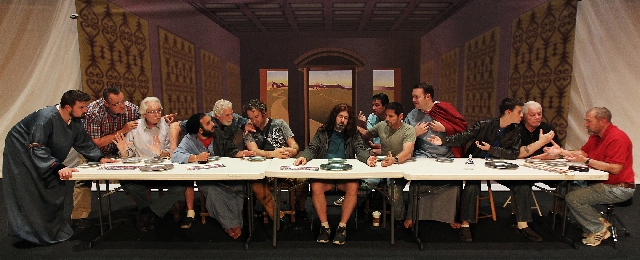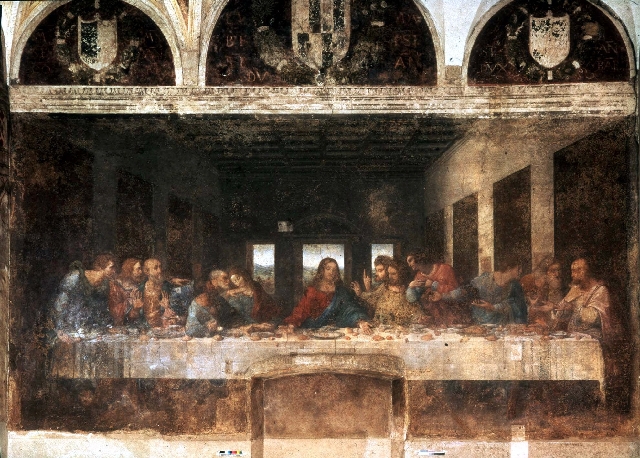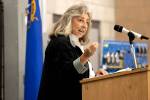Da Vinci’s ‘Last Supper’ comes to life



Watching the cast of “Betrayal: The Last Supper” rehearse, a thought occurs.
Did the apostles wear whatever the first-century equivalent was of those “Hello … My Name Is:” stickers on their robes?
We ask only because the cast of the Easter presentation — in which actors playing Jesus’ disciples re-create Leonardo da Vinci’s famous late-15th century mural — have a tendency to refer to one another by their apostle names.
“Hello, Simon,” director Sheila Cutting calls out to an apostle who’s just arrived.
“What’s up?” answers Simon (whose real name is Bob Singer).
Maybe it’s that method acting stuff you hear about.
Momentary confusion over names aside, the production that premieres this evening for a three-day run at Shadow Hills Church is a thought-provoking look at a group of men most have heard about but few know well. It’s based on da Vinci’s painting, which depicts Jesus and his apostles in the moments after Jesus has told his disciples that one of them will betray him.
During the drama, the actors portraying the apostles each break from the poses they hold to introduce themselves to the audience and talk about how meeting Jesus changed their lives. They voice surprise at Jesus’ prediction of betrayal and point fingers at those who they think the betrayer might be, speaking in tones of anger, bravado, confusion and fear.
And, ultimately, each is forced to ask the most searing question of all: “Is it I, Lord?”
Cutting, who heads Shadow Hills Church’s creative/performing arts ministry, says the script is adapted from that used for a production that premiered in Portsmouth, Va., on Palm Sunday in 1954.
“I tweaked the script somewhat because I wanted it to be more conversational,” adds Cutting, who also appended an epilogue in which the fate of each apostle is revealed.
Shadow Hills usually mounts a production for Easter, Cutting says. “But this year, Easter comes so quickly after Christmas, and we felt the Lord led us to this decision.”
During the show, the actors who portray disciples will face an unusual dramatic challenge: Holding completely still in their poses for about 50 minutes straight.
A few of the apostles are in “some pretty precarious positions,” Cutting adds. “If you try to hold that for 50 minutes, you’re going to get the shakes.”
A rehearsal one week ago marked the first time the actors ran through the entire play. Even without music, that meant about 30 minutes’ worth of pose-holding.
But even getting to that point took some time. As the actors assumed their “Last Supper” poses, Cutting made subtle corrections, moving someone over a few inches, having someone hold up an arm a bit higher or lower, and tilting somebody’s head ever so slightly.
The 21st century even poked its head into the production when an apostle’s cellphone rang, and when Cutting called for the run-through to begin, “action” somehow didn’t seem to be quite the right word.
It’s a moving presentation, however, and the most surprising discovery comes in seeing the disciples not as the historical, saintly figures we view them as now but as the normal guys — guys with fears and tempers, guys who hold grudges and even cling to prejudices and rivalries — they must have been then.
Peter Baldwin, who portrays Nathaniel (also known as Bartholomew) notes, for instance, that “there is a little bit of bad blood between him and Judas. In fact, Judas tried to get Jesus to remove Nathaniel away from the 12 at one point.”
“I won’t say he’s prejudiced,” Baldwin adds, but Nathaniel’s reaction upon being told about Jesus was to ask snarkily how anything good could come out of Nazareth, which then was considered “an insignificant town.”
“It’s been interesting to be able to relate to the human factor, if you will, because these guys are in the Bible and you set them apart from everybody,” Baldwin says. “But they’re like you and me, and mess up even more than we do.”
Ron Taylor, who plays Andrew, agrees that the drama “makes them more human.”
In the Bible, Jesus’ disciples appear to be “saintly, perfect men, and they weren’t,” he says. “They were all flawed men, and Jesus chose them to be the ones he was going to build his church on.”
At the end of the play, the audience learns that just one disciple, John, escaped martyrdom and that those who were martyred died in very unpleasant ways. No blasphemy intended but, by the end of the run-through, the actors may have learned a little bit about suffering, too.
After the script’s last words are uttered, deep breaths are exhaled, sore arms and shoulders fall, many groans are unleashed and a wave of sympathetic, vicarious relief spreads among onlookers.
It all looks painfully — literally so — sincere, too. Not at all like that method acting stuff you hear about.
Contact reporter John Przybys at jprzybys@ reviewjournal.com or 702-383-0280.
PREVIEW
What: “Betrayal: The Last Supper”
When: 7 p.m. today and Friday (doors open 6:30 p.m.) and 5 p.m. Saturday (doors open 4:30 p.m.)
Where: Shadow Hills Church, 7811 Vegas Drive
Tickets: Free (702-880-7811)


















